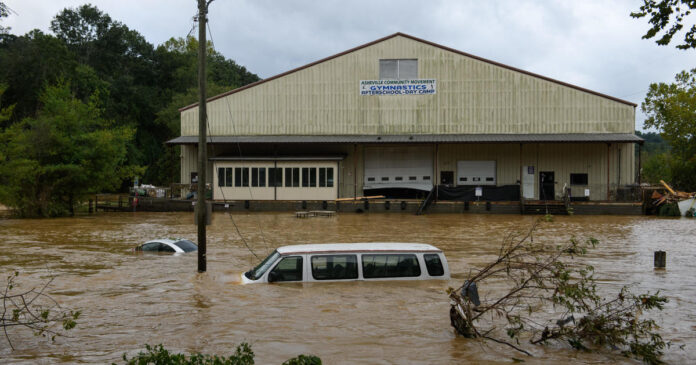Hurricane Helene’s wake of massive rains and flooding isn’t just destructive to property — it is also a major health and safety risk, leaving residents in the storm’s path stranded and potentially exposed to waterborne illnesses and other dangers.
As authorities rush to airdrop supplies, restore power and clear roads, the number of storm-related deaths climbed past 100 across the Southeast.
In the devastated city of Asheville, North Carolina, Megan Drye, who was rescued, watched as her 7-year-old son Micah and her parents got swept away into the flood. They were stranded on a roof when it collapsed into the water.
Vulnerable populations, including the elderly, children and those with pre-existing health conditions, are particularly at risk for flood-related hazards, internal medicine physician Dr. Shoshana Ungerleider told CBS News.
But experts say there are a variety of health risks to be aware of when it comes to floodwaters. Here’s what to be mindful of.
Floodwater drowning, injuries and diseases
Even for skilled swimmers, swift flood waters can quickly sweep anyone and anything in its path.
“Unfortunately, we’ve seen a trend on social media of people dancing and jumping head first into Hurricane Helene floodwaters,” said Peter Duncanson, disaster expert at ServiceMaster Restore, adding this underscores hazards associated with engaging with floodwaters.
Aside from the water itself being dangerous, floodwaters can also conceal downed electric lines and open manholes or drains, Duncanson said. Floodwaters can also carry harmful debris that can lead to injuries like glass and metal as well as rodents and snakes.
Then there’s the dangers you can’t see with a naked eye like pathogens.
“Mostly we worry about what we call ‘enteric pathogens’ — the same kind of bacteria that cause food-borne illness, like certain strains of E. coli, salmonella, shigella and yersinia. We also worry about norovirus and hepatitis A,” Dr. Daniel Kuritzkes, chief of the division of infectious diseases at Brigham and Women’s Hospital, told CBS News.
If drinking water becomes contaminated, drink only bottled (or boiled) water until advised by local authorities that the water is safe to consume, Kuritzkes said.
“Remember that you need clean water to be able to wash fruits and vegetables, so either peel or cook those before eating if you’re unable to secure a safe water supply,” he said.
Open wounds or rashes exposed to floodwater can also become infected, Dr. Robert Glatter, an emergency physician at Lenox Hill Hospital in New York City, previously told CBS News.
Avoid direct contact with floodwater whenever possible by wearing gloves and waterproof clothing and never walk barefoot through a flood.
“Often if your feet get waterlogged that’s a set-up for getting infections, including fungal infections between the toes,” said Glatter. “Wear high boots and keep your feet as dry as possible.”
Health impacts beyond flooding
Once water recedes, mold is another major issue that can trigger asthma and difficulty breathing, watery eyes and allergy-type symptoms, said Dr. Peggy Duggan, executive vice president and chief medical officer at Tampa General Hospital.
“That is why it is important to remove all furniture and items as well as drywall to mitigate the risk of mold,” Duggan said.
Glatter said carpeting and fabric-based furniture should not be salvaged.
“Bacteria can leach onto fabrics and lead to airborne infections,” he said. “I would not recommend holding onto anything with fabric that absorbs floodwater.”
Mold can appear in as little as 24 to 48 hours after floodwater recedes.
Loss of power and no access to air conditioning are also health risks to be cautious of, experts say.
“The loss of power and no access to air conditioning can increase risk to patients who have chronic medical conditions like asthma, COPD (chronic obstructive pulmonary disease) and cardiovascular disease, and heart failure,” Duggan said.
Mental health after Hurricane Helene
It’s not just physical health that can be impact by the hurricane’s devastation — mental health is another concern.
“Surviving Hurricane Helene can have significant impacts on your mental health,” Courtney Morgan, a licensed therapist and founder of Louisville, Kentucky, based mental health therapy practice Counseling Unconditionally, told CBS News.
Feeling scared, hopeless or isolated may come up during or after a hurricane or another natural disaster, she said.
“Many people have lost everything in these disasters, including their homes and even loved ones. Experiencing grief is challenging regardless of the circumstances; however, trying to navigate grief in the midst of a natural disaster is exceptionally difficult, as you often do not have the means to prepare a funeral or other arrangements for your loved ones. Additionally, you may experience survivors guilt if they know that other people have lost their lives,” Morgan said.
Post-traumatic stress disorder, or PTSD, and anxiety are mental health concerns that frequently emerge after such catastrophic events, Ungerleider said.
“During a natural disaster crisis, prioritizing mental health is critical for overall wellbeing and resilience. It’s important to first recognize and manage stress reactions early,” she said, adding a few suggestions to support your mental well-being:
- Maintain routines as much as possible to “create a sense of stability amidst chaos.”
- Stay connected to loved ones when possible (either virtually or in-person) for emotional support and to reduce feelings of isolation.
- Seek professional help from a mental health provider if symptoms like persistent anxiety, depression, or sleep disturbances are overwhelming, she added.
contributed to this report.



